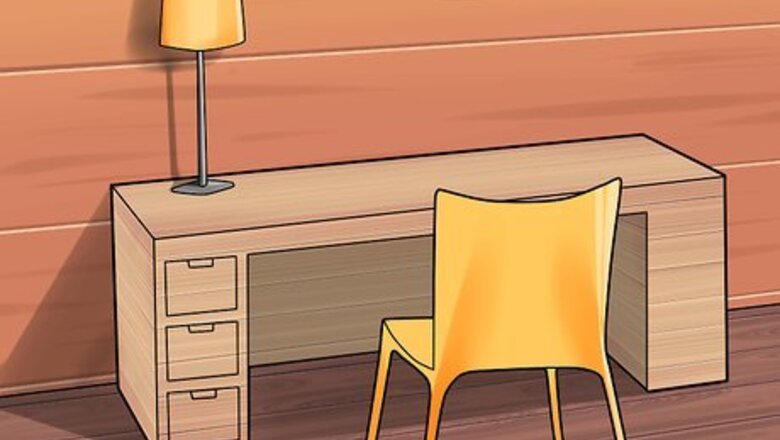
views
Organizing Your Revision
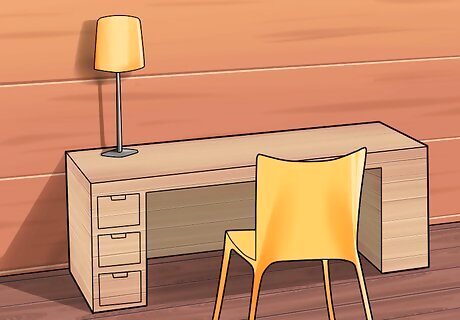
Find a good place to study. Find a quiet, well-lit place to work that will be comfortable and free of distraction. Log-out or temporarily disable social media like Facebook, Twitter or Instagram. The effort of logging in or enabling it will deter you and after a day you'll start to forget about it- you lose a lot of time to vines and stranger stalking! Also, science proves that our brains have optimum irritation levels - basically we work better if we're a little too cold, or on a rigid chair. sit to a desk or table- its more formal and re-creates the environment you'll be tested in. Yet feel free to get down to it in your jammies- you can wear comfy clothes on the day. Some people like to designate one specific study-place, while others enjoy moving between the their room, the coffee shop, the library, and other study-places to break up the monotony. Choose whatever works best for you and your habits. Some studies show that studying information in different places allows you to compartmentalize the information, making it easier to recall at a later date if you can associate the information with the location. Some students find studying in public to be more effective, making it more difficult to watch television or fiddle with other distractions found in the home. Know yourself and head your bad habits off at the pass.
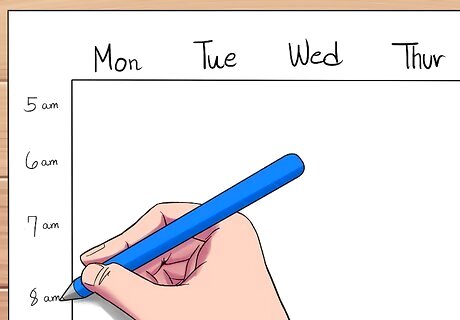
Draw up a timetable for your revision and stick to it. What do you hope to cover by the end of the week? By the end of the day? Working from a revision timetable helps you to make clear goals for each revision session and allows you to check them off as you progress. Revision plans can reduce anxiety, reassuring you that you've taken the necessary steps. Alternatively if this isn't your style and your life is more unpredictable, write up a tick list/ to-do list of all the subject areas or units you need to cover. You can do a separate colour or page for each of your subjects and see clearly exactly what you've covered or what needs doing. This allows for chunk revision or a variation of topics in one day. You can create your study schedule digitally or on paper—choose whichever option best motivates you. Reader Poll: We asked 396 wikiHow readers and 61% of them agreed that their preferred way to schedule study time is by making paper revision timetables. [Take Poll]
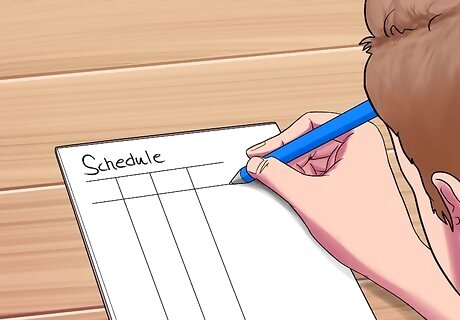
Set reasonable study targets that you know you can reach. Going over twelve chapters of trigonometry the night before a big exam is probably going to do more harm than good. Likewise, trying to revise all that Shakespeare several weeks out before being tested might not be the best way to remember the information by test-time. Organize in the most effective way to remember the most important information you've got to study. You could revise throughout the year by spending 15 minutes each day making notes you'll be able to rely upon later. By doing it in short stretches, you will remember more and feel less stressed. A month before your exam, you will have finished all your notes so you can spend a few hours a day reviewing notes and doing timed writing practice. If your exam is a long way off, (although this is probably not the case for 80% of you) after each lesson write up your new notes on a flash card (it only take a couple of minutes!) and keep it with your work. This way you're consolidating your knowledge and saving time and panic at the end of the year. If you are the 80% of last-minute panickers with 7 exams in 8 days just around the corner - DO NOT PANIC - it is NEVER too late. You've already started the journey here, and stressing out is the last thing you need to do. Prioritize the most urgent and important topics on your schedule. For instance, if you have one exam happening on Monday and another on Wednesday, spend more time studying for the Monday exam as it’s happening first.
Revising Actively
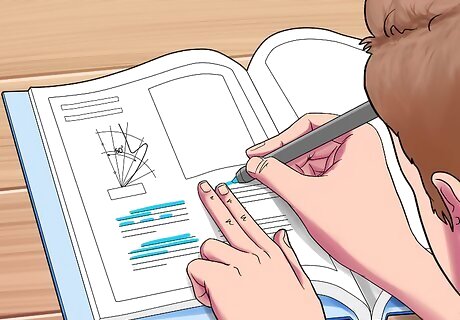
Engage your texts. Rather than simply reading quickly over the sometimes-dull texts you've got to study, take a more active role by making Q cards with your own questions on, 5 or so questions per card is appropriate and should cover all the information in the text. These questions can then be used for self-testing or get a friend/family member to quiz you, if you get it wrong, the answers are on the back! Bright colors help make this bit more fun too as-well as organizing your subjects. Also, you could: highlight your notes/book, mind map/summarize the ideas on each page or TEACH what you've learned to a friend or family member. The best test of knowledge is if you can teach it-remember: "If you can't explain it simply- you don't know it well enough." (Albert Einstein) By turning your revision into an activity you must participate in, you can liven it up a bit and help your memory work more effectively. Ask open-ended questions of each text or subject you revise by writing questions in the margin, or on a separate sheet of paper. Try to think about the consequences should certain elements of it be changed, or should certain features occur differently. Whether it is science or history, small changes can make big differences and your thinking process is the important part.

Recall and summarize. As you're studying, stop every few minutes to recap what you've read. Write a short summary--a few sentences--in your notes, or at the bottom of the page. Use your own words. A good way of recalling is writing your notes down from memory and then going back over them and filling in the gaps with another color of pencil or pen. You'll know the different color refers to information you might have trouble remembering. Periodically, Try to repeat the process of summary, writing down on a separate sheet of paper what you know about a given topic or subject without consulting your books or your previous notes. Compare your new notes to your old, finding what you've left out and what you still need to memorize.
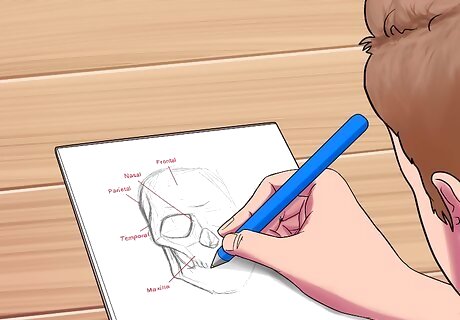
Draw or doodle freely while you study. For a visual learner, it's important to break down information into drawings or diagrams, to make recall easier in the long run. Diagrams, mind maps, and freehand drawings can be useful ways of improving both your understanding and creating a much easier memory aid than reading the text alone. Do not be afraid to use colors in much the same way––color your drawing or highlight the text.

Find someone who knows nothing about the topic and explain to them. Even if it is explaining to the mirror or your cat, just take the time out to talk to someone as if the person is learning about it for the first time, and you are the teacher. It is hard to forget information once you have done this, and also forces you to clarify the information and lay it all out in the most concise and simple way possible. If no one's around, pretend you're on TV or the radio being interviewed about the topic. Ask yourself a series of questions and reply as succinctly and clearly as you can, pretending people are listening and wanting to learn all about it.
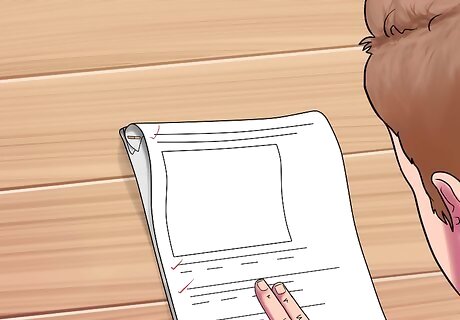
Try to use a study guide or old test. Answering past exam or test papers in the same time limit, as the real exam or test will be gives you an opportunity to test yourself under the same constraints. It will be a chance to see whether there are gaps in your knowledge that you need to go back over and it'll also be useful to see if you can get down all that you want to say in the time allotted. Do the practices under timed conditions by using a timer, which could be on your phone.You may also find some important questions, who knows?

Take breaks periodically to give your concentration a boost. If you take breaks regularly, your concentration will be better and you will find yourself retaining more information than if you try to plow straight through. Don't waste energy and time revising with an over-tired mind that won't remember what it just read. Try to stick to your schedule. Make sure to check off topics and subjects as you accomplish revising them. It may even be a good idea to reward yourself with a treat on the completion of a target to help you get there. It is a good motivation to not consider giving up as an option.
Finding Support

Talk to your teachers. Look on your teachers and professors as part of your support network and use them for the resource they offer. Ask for their assistance when it becomes clear you need it. Knowing earlier rather than later in your revision will make it easier to approach them and get their help.

Revise with other classmates. Find a suitable group of good students who hope to succeed, and schedule regular meetings in between your other revision activities. Discuss the topics of revision, helping each other solve problems, understand the materials, and test one another over the reading. Studying in a group can be a great way of reducing anxiety levels and making revision fun, as well as productive. Find ways to test each other, playing revision games as challenges. Use flash cards or structure your study sessions like a quiz game. Chat online if you haven't time to catch up in person. Make sure your revision time with friends is spent actually revising. You may actually be better off revising with classmates you're not friendly with to make it productive.

Let your family help you. Your family can help support you even when they cannot understand what you are learning. Ask them to test you, clarify problems for you, read with you, and help you to stay organized. Parents and siblings who have already experienced revision will have some good ideas to help you prepare. Moreover, family and friends can be good moral support when you are feeling down or anxious about the revision. You may need emotional support as much as other support and if you can trust in someone to talk to about your anxiety or worries, this can help you to offload many unneeded troubles to a caring listener. Even having someone, you can trust like this available online or by phone is better than no one.

Stay relaxed. Spend time doing something relaxing each day, such as listening to your favorite music, going for a walk or swim, spending time with your pets or talking with a good friend. These activities will help you to feel relaxed and connected to others and the world as you keep working through the revision. You can also practice relaxation exercises, meditation, or simply just lying back and chilling out now and then...Possibly with a Q card in your hand.

















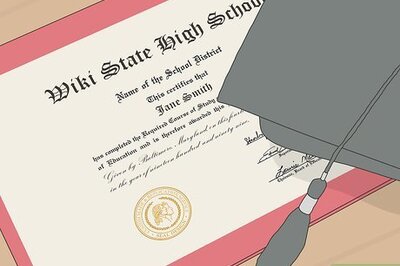


Comments
0 comment